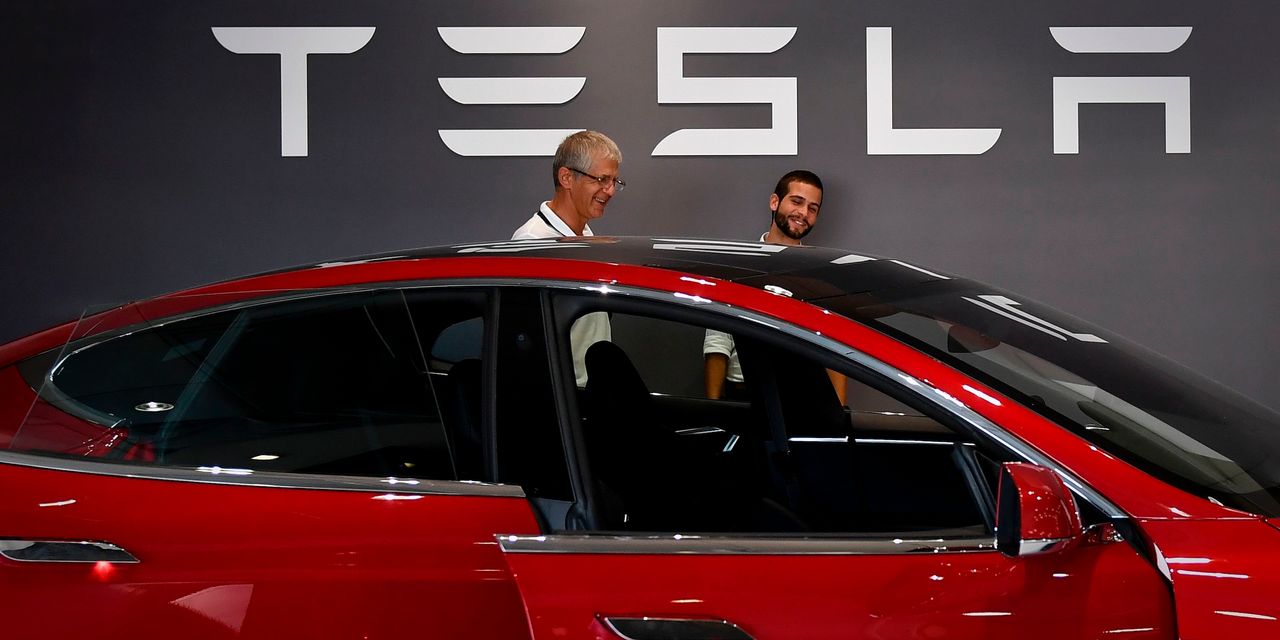
Tesla Inc.’s profit topped $1 billion for the first time in the company’s history and its sales nearly doubled, zooming past Wall Street expectations, but there was no stock rally late Monday as “limited” battery supply and the ongoing chip shortage crimped the Silicon Valley electric-car maker’s output and forced it to delay the launch of its commercial truck.
Tesla TSLA, +2.21% said it earned $1.14 billion, or $1.02 a share, in the second quarter, compared with $104 million, or 10 cents a share, in the year-ago quarter. Adjusted for one-time items, the company earned $1.45 a share.
Revenue rose 98% to $11.96 billion, from $6.04 billion a year ago, which the company pinned in part on “substantial growth” in vehicle sales.
Analysts polled by FactSet expected Tesla to report adjusted earnings of 94 cents a share on sales of $11.51 billion in the quarter. Monday’s results marked the eighth straight GAAP and adjusted quarterly profit for the company. But Tesla shares gained only 1% in after-hours trading.
The chip shortage “remains quite serious,” Chief Executive Elon Musk said in a call after the results. “The chip supply is fundamentally the governing factor on our output,” and it’s hard to say how long it will last because it’s out of Tesla’s control, he said.
Tesla has used alternative chips, but that’s not just a matter of doing a swap, as new software then has to be rewritten, Musk said.
Besides the delay of the Semi launch to 2022, Musk and Tesla executives left vague the start of production of the Cybertruck, its much-awaited pickup, at the under-construction Austin, Texas, plant, saying only it would be later this year.
Production of the vehicle was expected for early 2021, and the Tesla Semi, revealed in 2017, has been delayed by a couple of years.
Musk also surprised Wall Street by saying he’d be unlikely to be on future Tesla earnings calls, “unless there’s something important I need to say,” he told analysts and others.
In a now-famous post-results conference call in May 2018, Musk cut off both analysts and his own executive team, called analyst questions “boneheaded” and “boring,” and blamed the press for what he saw to be greater coverage of autonomous-driving car crashes than human-enabled crashes, a criticism that he would go on to lob again, on several occasions.
More recently, in an earnings call in April 2020 he doubled down on criticism of shelter-in-place orders, then in place to curb the spread of COVID-19 and which affected Tesla’s factory in California, calling it an “infringement of people’s rights” and likening them to fascism.
In its usual letter to investors Monday, Tesla said it remained on track to build its first Model Y compact SUV in factories going up in Berlin and Austin this year, with the pace of the production ramp “influenced by the successful introduction of many new product and manufacturing technologies, ongoing supply-chain related challenges and regional permitting.”
“To better focus on these factories, and due to the limited availability of battery cells and global supply chain challenges, we have shifted the launch of the Semi truck program to 2022,” it said.
From June: Tesla’s president of trucking Jerome Guillen leaves company
“Tesla’s numbers, beating estimates by a healthy margin, confirm strong global demand for EVs continues, enough to more than offset Tesla’s near-term challenges,” said iSeeCars.com analyst Karl Brauer.
The delay for the Semi was “a bit of a disappointment … but not that big of a deal” in the big picture, Argus Research’s Bill Selesky said.
Tesla’s operating income increased year-on-year mainly on volume growth and cost reductions, but those were offset in part by rising expenses, additional supply-chain costs, lower revenue from regulatory credits and a “bitcoin-related impairment of ($23 million),” the company said.
Tesla kept its sales guidance for the year intact and nonspecific, saying that “over a multi-year horizon” it expects 50% average annual growth in vehicle sales, and sees 2021 as a year it could grow faster.
Tesla reported a mixed first quarter in April, beating Wall Street expectations for adjusted profit but missing the sales forecast by a hair, with the company beset by parts shortages and other snags.
Tesla shares have lost about 6% this year, and are holding on to gains of about 133% for the past 12 months. That compares with an advance of around 18% and 37% for the S&P 500 index SPX, +0.24% in these same periods.







